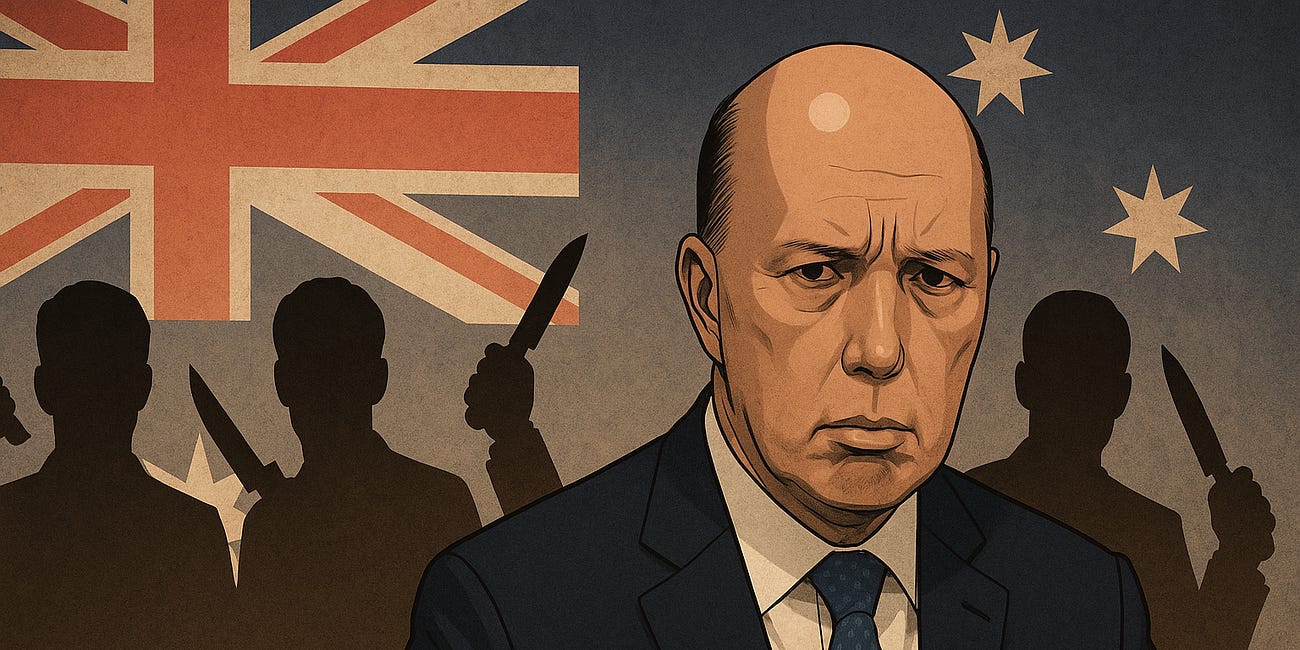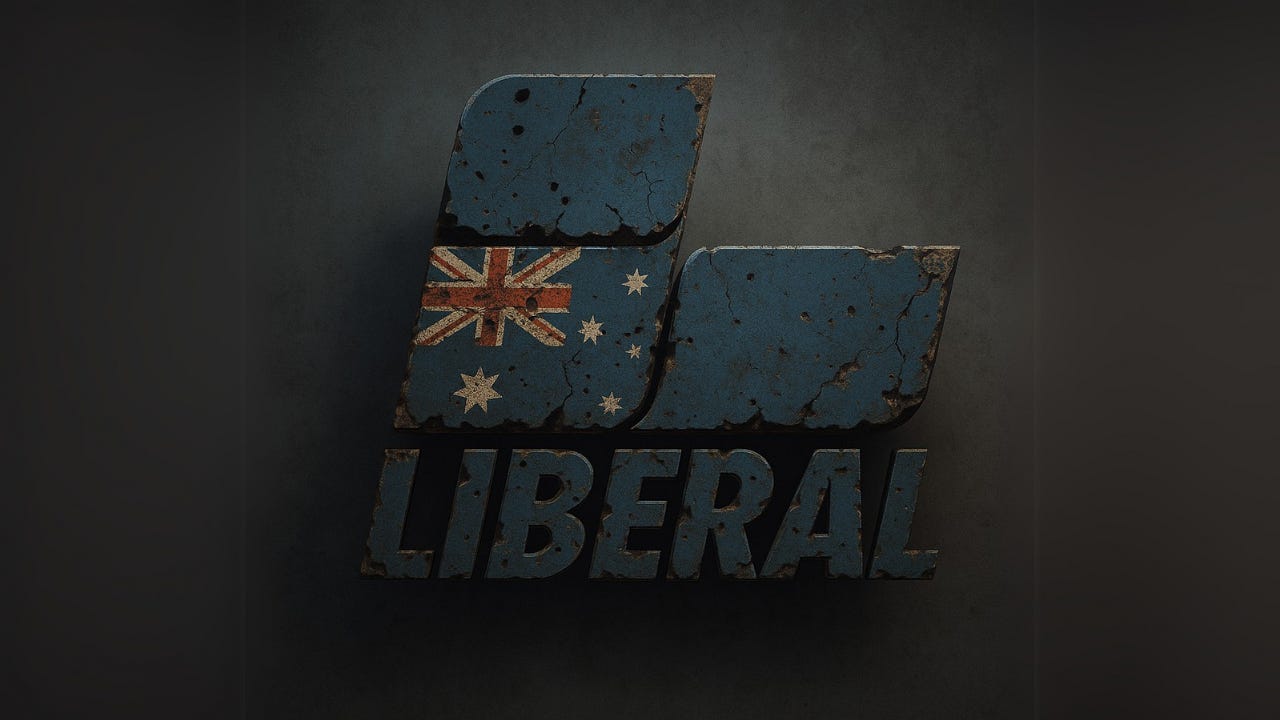The Sabotage Deepens
Nation First looks further into how the Liberal Party engineered Its own defeat.
Dear friend,
Since the publication of The Sabotage of Peter Dutton, the floodgates have begun to open.
Read that article below:
Since then, Liberal Party insiders — from HQ staffers to local campaigners and fundraising coordinators — are now confirming direct to Nation First what the base long suspected: the 2025 federal campaign was not simply mismanaged; it was systematically gutted from within.
Liberal insiders confirmed the 2025 campaign was sabotaged internally, with polling and strategy fatally flawed from the outset.
The party relied on a single, misleading polling source, leading to wildly inaccurate seat predictions and misallocated resources.
Media buys were botched nationwide, with ads airing in the wrong regions and decisions appearing driven by internal favouritism, not electoral success.
Fundraising efforts were obstructed, with large donations stalled by hidden backend blocks and HQ offering no clear answers.
Critical campaign opportunities, including cost-of-living stunts and viral public moments, were ignored or shut down, while internal divisions undermined leadership and cohesion.
At the centre of the dysfunction was a polling operation allowed to run unchecked. The Coalition placed all its strategic faith in a single data source, used across both the Liberal and National parties, without any internal capacity for cross-checking or critical review. Unlike in previous elections, there were no seasoned campaigners sounding out the polling assumptions, no policy minds war-gaming the trends. Decisions were made in isolation, and they were wrong.
On election night, multiple staffers in HQ confirmed the mood turned instantly sour, not because of Labor’s success, but because of the realisation that the entire campaign had been built on faulty numbers. A strategic fog had descended weeks earlier, but by then, critical resources had already been misallocated.
One Coalition parliamentarian passed on to me what was described as “the final goss from inside polling.” The Coalition had reportedly been told they would win 67 seats and hold Labor to 74. Dutton’s own seat was forecast at 55–45 in his favour. Gorton was predicted as a narrow Liberal win at 52–48. The result in that seat ended up 39–61 with a swing to Labor. Tasmania was forecast to remain unchanged, but the Liberal primary vote collapsed from 34.6% in 2019 to just 24.3% in 2025. These were not just off-target numbers—they were fantasy. And they informed the entire strategy for the Liberals.
That confusion extended beyond polling. The company tasked with handling media buys has been widely described as out of its depth. Advertising placements were botched at scale, with messaging meant for Victoria airing in Queensland, and inner-city brand pieces dumped into suburban marginals. These weren’t errors of judgment; they were basic logistical failures, made worse by a refusal to course-correct. Cheaper and more effective placements were ignored. Well-placed sources say the media strategy appeared less concerned with winning seats than with distributing contracts to the right internal networks.
The collapse of strategic thinking was matched by sabotage in the fundraising process. Multiple party sources who assisted with efforts to raise funds for Dutton-aligned candidates in Western Sydney described a repeated pattern: donation forms, often for tens of thousands of dollars, would be submitted and manually marked as approved. Weeks would pass, and the funds wouldn’t arrive. When campaign managers chased the money, HQ staff would provide vague assurances that it was coming in the next pay cycle. It never came. Only after escalating the issue did some discover that backend notes, which weren’t visible through the usual process, had flagged minor administrative issues to halt the processing of donations. No emails were sent. No alerts triggered. And calls to HQ were met with shifting explanations and bureaucratic stonewalling.
Even when retail politics opportunities were teed up, they were shut down. One campaign pitch that had received internal support was to have Peter Dutton visit selected service stations willing to drop their petrol prices temporarily, in line with the Coalition’s proposed fuel excise reduction. The stunt would have offered a visual demonstration of cost-of-living relief. But HQ killed the idea, citing legal concerns that, according to those involved, had no basis. What aired on TV was a hollowed-out version: Dutton at the bowser, with no visible price cut. The original impact was lost.
At a moment when cost-of-living pressure was dominating public concern, the campaign was also handed a powerful human-interest opportunity — and ignored it. A young man named Morgan Cox had made national headlines for staging a lone protest outside Prime Minister Anthony Albanese’s $4.3 million clifftop home. His message was about housing, and the growing impossibility of keeping a roof over his family’s head. He made it clear he was willing to meet with any MP who would hear him out, including Peter Dutton. The optics would have been extraordinary: a major party leader speaking face-to-face with a young father who had captured national attention. The opportunity was raised with the campaign team time and time again. There was no response.
At the strategic level, Dutton’s position had been strong through 2024. His hard contrast with Labor had produced a surge in support, with some polls so favourable that the government considered calling an early election, one that was only delayed due to a natural disaster. But when the campaign began in earnest, Dutton, under pressure from within, approved a pivot back to the so-called “sensible centre.” It was a catastrophic mistake. The Coalition softened its tone, watered down its message, and returned to chasing the same Teal seats that had rejected them two elections in a row.
Insiders are divided on why Dutton made this decision. Some believe he was pressured into it by factional operatives. Others say he wanted to preserve unity and avoid a fight with the NSW and Victorian machines. Either way, it marked a clear turning point. The leader who had once built momentum by offering clarity and conviction was now surrounded by operatives who resented that very success, and he chose to work with them instead of confronting them. That decision would haunt the campaign to its end.
While the campaign was faltering, internal destabilisation continued. A well-known female federal Senator has been alleged to have repeatedly undermined the campaign. Within the leader’s office, respected strategists and policy thinkers were sidelined or overridden by HQ, where logistics failed, messages were diluted, and campaign planning collapsed.
Then came the post-election spin. In a widely circulated email to members, the NSW administrative committee insisted, “All our candidates can hold their heads high. This result is not a reflection on any candidate, personally.” They praised the “professionalism of Chris Stone and the NSW Secretariat,” insisted the campaign had been conducted with “budget discipline,” and declared: “We are not for giving up the principles and values that Menzies set out 80 years ago.” The message made no mention of polling failure, media dysfunction, blocked donations, abandoned campaign opportunities, or the neutralisation of the leader’s office.
Instead, members were told: “Now we have a duty to ensure that this is the low point for the Liberal Party… Our duty is to Sir Robert Menzies, John Howard and all the people gone before us who made our Party great… As a Liberal family we need to join together and work to heal this wound.”
But the wound is not healing because those who inflicted it are still in charge. Until they are removed, there can be no recovery, no reform, and no real opposition.
This wasn’t a campaign that lost control. It was a party that surrendered it.
Deliberately.
Until next time, God bless you, your family and nation.
Take care,
George Christensen
George Christensen is a former Australian politician, a Christian, freedom lover, conservative, blogger, podcaster, journalist and theologian. He has been feted by the Epoch Times as a “champion of human rights” and his writings have been praised by Infowars’ Alex Jones as “excellent and informative”.
George believes Nation First will be an essential part of the ongoing fight for freedom:
“The time is now for every proud patriot to step to the fore and fight for our freedom, sovereignty and way of life. Information is a key tool in any battle and the Nation First newsletter will be a valuable tool in the battle for the future of the West.”
— George Christensen.
Find more about George at his www.georgechristensen.com.au website.







Thanks for another great article George to explain this abomination of the weekend... Can you possibly start naming these faceless traitors within the LNP?
Questions: Why was this done? What was/is the motive? Who are the traitors to the Liberal party and Australia? And What Corporations are involved? There has to have been payouts to traitors and This looks to be a backlash against Peter Dutton due to the huge Success of the No vote to the Voice.
Many Corporations and the WEF would not have been happy with the Voice results.